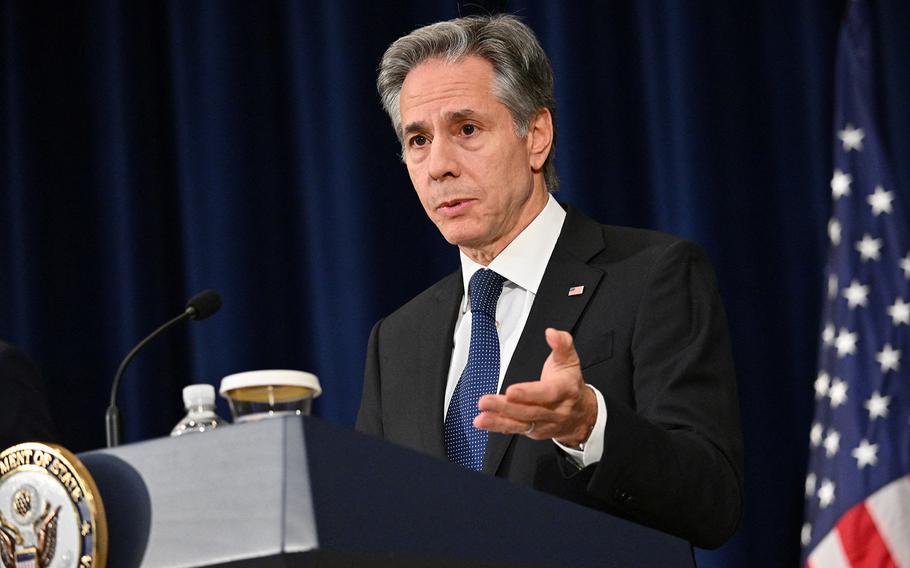
Secretary of State Antony Blinken speaks during a press conference with NATO Secretary General Jens Stoltenberg at the State Department in Washington on Jan. 29, 2024. (Mandel Ngan, AFP via Getty Images/TNS)
(Tribune News Service) — Iran urged the U.S. to use diplomacy to ease tensions in the Middle East, as Tehran braces for a military response to a deadly attack on an American base on Sunday.
The foreign minister of the Islamic Republic said “active” diplomacy is underway to find a political solution to the war in Gaza and the regional fallout, without elaborating.
“The White House knows very well” that the way to end the war “and the current crisis in the region is political,” Hossein Amirabdollahian said in a post on X.
The comments came as the U.S. weighs how to retaliate against a deadly attack on a base in Jordan that killed three American soldiers and injured dozens. President Joe Biden blamed Tehran-backed militias in neighboring Syria and Iraq and said he’d respond “at a time and in a manner of our choosing.”
Iran denied involvement in the strike, which was the first to kill Americans since the outbreak of the Israel-Hamas war in Gaza in October.
Many Republicans, including former President Donald Trump, have said the attack shows Biden’s been too soft on Iran.
The U.S. and Iran don’t have formal diplomatic ties but have exchanged messages about the crisis since October, sometimes through the Swiss embassy in Tehran. Both sides say they want to deescalate the situation while blaming the other for inflaming it. The U.S. says Iran’s support for regional militias is fueling tensions, and Tehran says Washington must put pressure on Israel to end its military offensive in Gaza.
Hamas militants attacked Israel on Oct. 7 from Gaza, triggering the war and roiling the wider region. Since then, U.S. bases in Iraq and Syria have come under regular fire from Iran-supported groups. Hezbollah, also backed by Iran, is exchanging fire with Israeli forces almost daily across the Israel-Lebanon border.
The Houthis, meanwhile, have caused mayhem in the shipping world with attacks on vessels around the southern Red Sea. They say they won’t back down until Israel pulls out of Gaza, despite the U.S. and U.K. launching missiles on their positions in Yemen.
“This is an incredibly volatile time in the Middle East,” U.S. Secretary of State Antony Blinken said Monday. “I would argue that we’ve not seen a situation as dangerous as the one we’re facing now across the region since at least 1973,” he said, referring to the year in which Israel fought the Yom Kippur war against Egypt and Syria.
“We’ve made very, very clear from day one that we’re going to defend our people, we’re going to defend our personnel, we’re going to defend our interests,” he said. “At the same time, the president’s been very clear that we want to prevent broader escalation.”
©2024 Bloomberg L.P.
Visit bloomberg.com.
Distributed by Tribune Content Agency, LLC.